Good Score for GMAT 2025 PDF Download
The GMAT is a common tool used by business schools and MBA programs to evaluate applicants for admission. Although admissions officers consider various factors in their decision-making process, a high GMAT score can have a significant impact on your chances of being accepted into your desired school.
By gaining the necessary skills and undertaking effective preparation, you can improve your GMAT score and increase your likelihood of admission to business school. Continue reading to discover what a strong GMAT score entails.
What is the Average GMAT Score
According to the Graduate Management Admission Council (GMAC)—the body that administers the GMAT exam—two-thirds of GMAT test takers receive a Total Score between 400 and 600. The average score among all test takers in the past three years is about 568.
The average scores broken down by section are:
- Analytical Writing Assessment: 4.43/6
- Integrated Reasoning: 4.6/8
- Verbal: 27.26/51
- Quantitative: 40.7/51
GMAC notes that for the Verbal section, it’s rare to score below 9 or above 44, and for the Quantitative section, it’s rare to score below 7 or above 50.
What Is a Good GMAT Score?
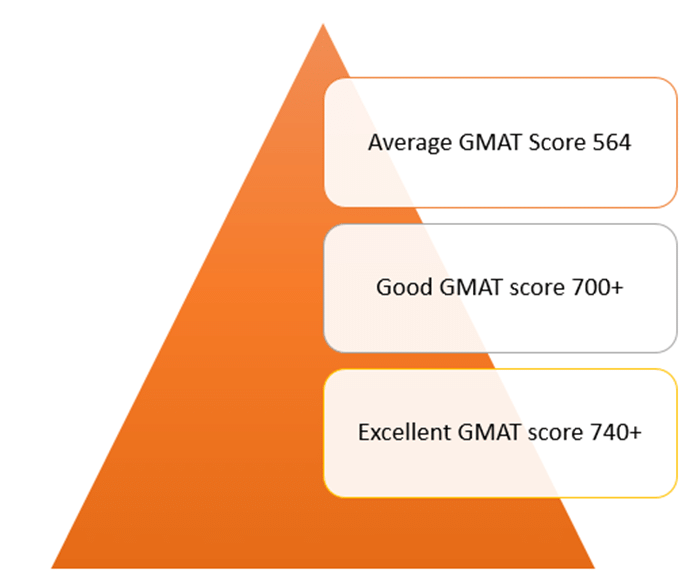
- A GMAT score around the 75th percentile, or 650, can be considered a strong score for many MBA and graduate business programs. However, more selective programs typically require higher scores in the 700s, which correspond to the top 10% of test-takers.
- If you're applying to less competitive schools, aiming for the median score of 590 is a good idea. This score means you performed better than most test-takers.
- The GMAT total score is calculated by combining the scores on the Verbal and Quantitative Reasoning sections, and ranges from 200 to 800. The Graduate Management Admission Council (GMAC) is responsible for designing and administering the GMAT.
The table below illustrates the GMAT score percentiles for tests taken between 2018 and 2020 and how these scores correspond to percentiles.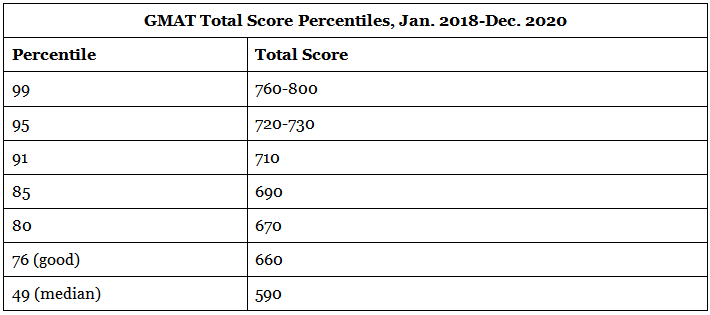
What is a Good GMAT Integrated Reasoning Score?
- Scoring a 6 or higher on the Integrated Reasoning section is typically considered good, placing you in the 64th percentile, surpassing roughly two-thirds of test-takers. A score of 7 would place you in the top 20%, and a perfect score of 8 would put you in the top 10%.
- The Integrated Reasoning section is scored on a 1-8 scale and evaluates your ability to use data to solve complex problems, which may include text, numbers, and graphs from various sources. Some questions may have multiple parts, and you must answer all parts correctly to receive credit.
- While Integrated Reasoning scores are not as crucial as your overall GMAT score, they do showcase your ability to analyze large amounts of data from diverse sources and make informed decisions. This is a valuable skill set for many business schools and graduate programs.
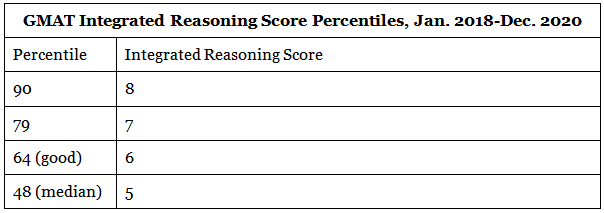
What Is a Good GMAT Analytical Writing Score?
- A score of 5.0 or higher is generally considered a good GMAT score on the Analytical Writing Assessment (AWA). Scoring in this range would mean that you have outperformed about 60% of test-takers. Achieving a score of 5.5, which is only half a point more, would place you in the top 20% of test-takers.
- The AWA section is scored by both human graders and an automated algorithm. Your AWA score will be given on a scale of 1-6, in half-point increments. This section requires you to write an essay that analyzes a business-related argument. It is designed to assess your critical thinking skills and your ability to express ideas in a clear and coherent manner. You will have 30 minutes to complete your essay.
- Although AWA scores are important because they measure your critical thinking abilities, they are not as crucial as your total GMAT score for most business schools.
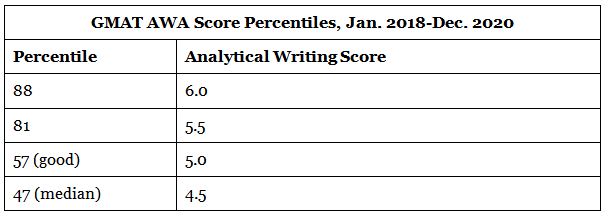
Average GMAT Scores for 20 Popular Business Schools
The average GMAT score is 568.21, but that doesn't mean such a score will cut it for most MBA programs. The following table shows the average GMAT scores for incoming students in 20 popular full-time MBA programs around the U.S.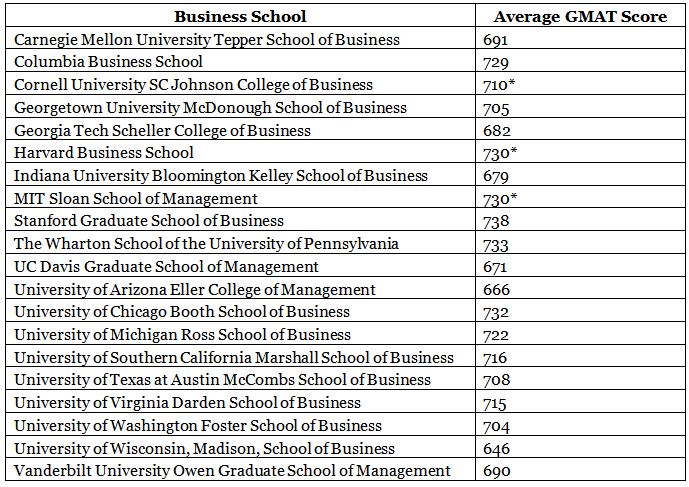
What Is a Good GMAT Score Based on Your Programs?
- Rather than becoming preoccupied with percentiles, it's more beneficial to identify what a good GMAT score means for your individual aspirations and situation. Your target score should be influenced by the business schools you plan on applying to and their respective average GMAT scores for admitted students, which can be obtained from class profile pages or the table above.
- There's no need to strive for an exceptionally high score, like a 730, unless you're applying to a top-tier institution like Harvard Business School.
- Instead, aim for a score that aligns with your target program's average GMAT score or the most competitive program you're considering. By doing so, you can improve your likelihood of acceptance across all schools you're applying to.
Frequently Asked Questions (FAQs) on Good Score for GMAT 2023
What is a good GMAT score in 2023?
A good GMAT score in 2023 will depend on the business schools you are applying to and their average GMAT score for enrolled students. However, in general, a score in the mid-600s can be considered a good GMAT score. Scores in the 700s are typically required for more selective and competitive programs.
What is a good score for the Integrated Reasoning section of the GMAT?
A good score for the Integrated Reasoning section of the GMAT is generally considered to be a 6 or higher. A score of 7 or 8 would be even better and put you in the top 20% or 10% of test-takers, respectively.
What is a good score for the Analytical Writing Assessment (AWA) section of the GMAT?
A good score for the Analytical Writing Assessment (AWA) section of the GMAT is generally considered to be around 5.0 or higher. A score of 5.5 or higher would put you in the top 20% of test-takers.
Should I focus more on my overall GMAT score or my scores on individual sections?
Both overall GMAT score and scores on individual sections are important, but the weight given to each score may vary by business school. Typically, your overall GMAT score is the most important factor, followed by your scores on the Quantitative and Verbal Reasoning sections. Integrated Reasoning and AWA scores are generally considered less important but can still be factors in admission decisions.
How can I determine what a good GMAT score is for the business schools I'm interested in?
Research the average GMAT score of enrolled students for the business schools you are interested in. This information is usually available on schools' websites or class profile pages. You can also consult the percentile rankings and score ranges provided by the GMAC. Once you have this information, develop a target score based on the most competitive program you're applying to.




















